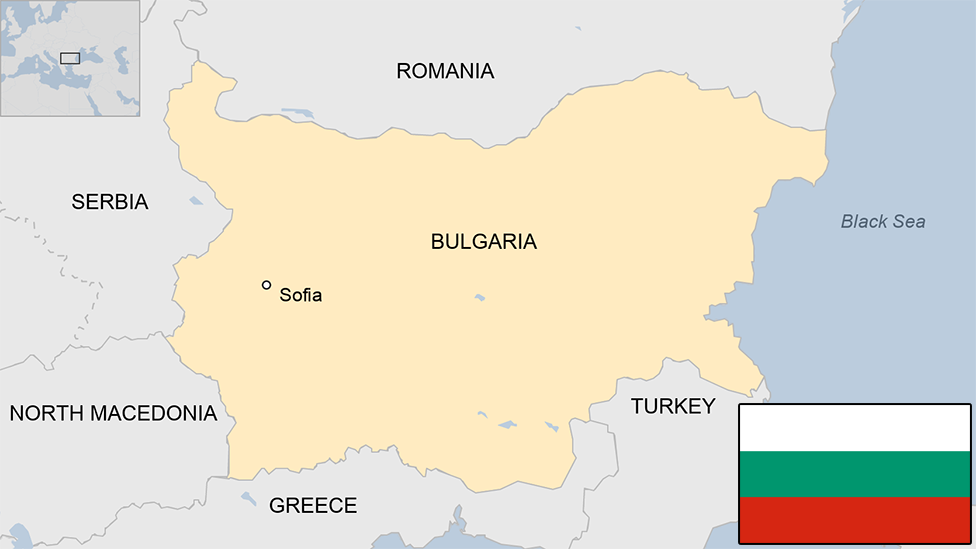Patience running out in Bulgaria
- Published
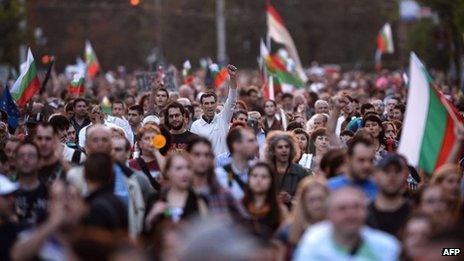
Thousands of Bulgarians have been demonstrating in Sofia to demand the resignation of government
Protesters in Bulgaria pack the streets of Sofia each evening, but after 35 days in a row, their patience with Prime Minister Plamen Oresharski's government is wafer-thin.
"People are getting angry, we want action fast but we feel they are not listening. They say 'we can hear you,' but all they really hear are our whistles and our drums. They just don't listen to our words," says Gergana, who runs an advertising company.
The words chanted by the crowds are blunt and uncompromising, led by one with three syllables: "Ostavka!" (Resign!)
It is written everywhere in the Bulgarian capital, on the sides of municipal rubbish bins, and on the statues of the founders of Sofia University. The streets thunder with the word.
Each day the protesters produce surprises - on Sunday it was air-raid sirens, on Monday it was a rain dance, as the crowds jabbed the skies with banners, like umbrellas, with a tribal roar.
Interior Minister Tsvetlin Yovchev says the protesters' main demand will not be met.
"A possible resignation of the government would result in a deepening of the crisis and the country would go into a spiral," he tells me.
But he admits the current stand-off between the state and the street cannot continue.
"If we leave the protest so long... and these people cannot find a real mechanism to resolve their problems, this is the first step to radicalisation."
Fear of violence
One of the frustrations for the government is that the protests have no obvious leaders for them either to negotiate with, or to blame. Many groups have sprung up which brainstorm ideas on social media sites and organise specific actions, to mock the government, thank foreign ambassadors who sympathise with them, or simply to entertain their fellow protesters.
"There are three reasons why this government's chances of survival are slim," says Daniel Smilov of the Centre for Liberal Strategies.
"The longevity of the protests, the unity of the protesters behind a single demand, and the popularity of the protesters in the country."
The latest survey suggested 58% agree that the government should resign - protest organisers claim that is a gross underestimate.
Both the government, and the protesters themselves, fear a radicalisation of the streets.
"The most important group of people are those who spontaneously go to protest against their lack of representation in this political system, and against... a lack of justice," says the interior minister.
"We should listen very carefully to these people and support their right to protest."
But there is another group, he alleged, which is looking for violence.
A facebook event organised in front of parliament this Thursday, the birthday of the 19th-Century revolutionary, Vasil Levski, is advertised under his slogan: "The patience of the people has reached the point of no return."
A comment attached to it by a respondent calling herself Muffin Dinosaur says: "I will do everything to come. Go there and beat the crap out of them."
One, Tichomir Gergov, adds: "I'm coming with a baseball bat."
Lack of a plan
In February, the previous, centre-right Gerb government was toppled by protests, which began over high heating bills, and grew into a wave of discontent with the whole ruling elite. There are big differences, but also similarities, between the protests then and now.
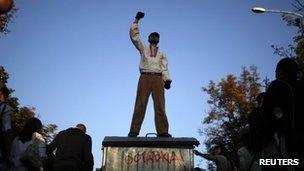
Ostavka! (Resign!) is a word written everywhere in Sofia, even on the sides of municipal rubbish bins
In February, those on the street were poorer, and more desperate. Now they are better-off and more confident.
There is more humour now. The wave of self-immolations, which claimed the lives of six Bulgarians, is over. What the winter and summer protests have in common is a disgust with politicians and businessmen in each others' pockets.
A number of scenarios are emerging which could end the stand-off. Cracks have appeared in the parliamentary parties which support the fragile government.
The French and German ambassadors made a joint statement criticising the government. The president says he has lost confidence in it.
The US, British and other ambassadors are busy behind the scenes. There is disquiet in Brussels, and in the Party of European Socialists, that a Socialist-backed government is held in place by the vote of the far-right Ataka party.
Protesters mock Plamen Oresharski's government as a "coalition" of socialists, liberals and extreme nationalists".
Above all, the government seems weakened by the lack of a joint plan to present to the nation.
"At this moment there is no clear plan," the interior minister admits, with remarkable honesty.
The government argues that new elections would just produce a similar stalemate in parliament.
Commentators suggest that is not necessarily true.
They say a lowering of the electoral threshold to allow more parties into parliament would allow better representation, more coalition options.
And that the broad use of the remarkably fast internet in Bulgaria would allow citizens to switch their skills from monitoring the state, to participating in democracy.
Also, that a strict ethical code to split rich businessmen from politics - the "mafia" which protesters claim runs the country - would help bridge the gap between those in power, and the people.
- Published5 July 2013
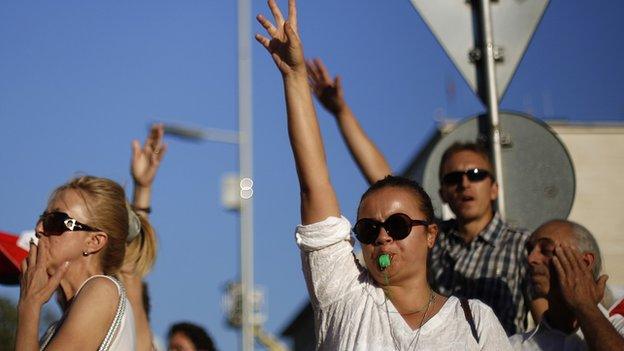
- Published19 June 2013
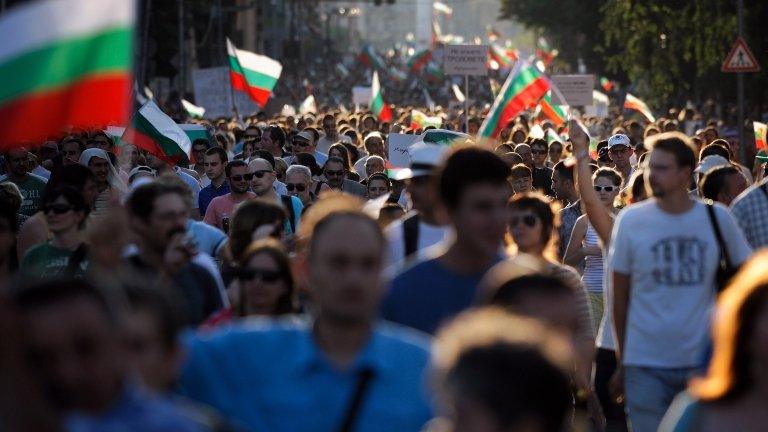
- Published20 January
